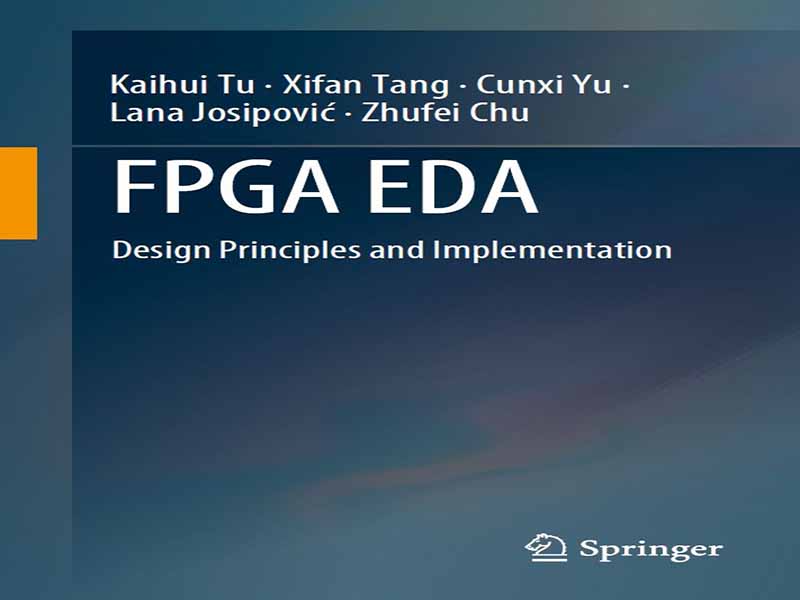- عنوان مجله: FPGA EDA Design Principles and Implementation
- نویسنده: Vaughn Betz
- حوزه: FPGA
- سال انتشار: 2024
- تعداد صفحه: 229
- زبان اصلی: انگلیسی
- نوع فایل: pdf
- حجم فایل: 11.3 مگابایت
اتوماسیون طراحی الکترونیکی (EDA) برای آرایه دروازه قابل برنامهریزی میدانی (FPGA) یک حوزه مطالعاتی میانرشتهای ویژه است. نرمافزار EDA در کل چرخه عمر طراحی FPGA، از جمله مرحله طراحی تراشه و مرحله طراحی کاربرد، اجرا میشود. با افزایش روزافزون تقاضا برای سیستمهای الکترونیکی سفارشی و خاص کاربرد، FPGAها به انتخابی محبوب برای پیادهسازی طرحهای دیجیتال پیچیده تبدیل شدهاند و FPGA EDA کلید تحقق این امر است.
این کتاب با هدف ارائه اصول و پیادهسازیهای جامع و بهروز از فناوری FPGA EDA، با جذب مواد مغذی از صنعت و دانشگاه، نوشته شده است. این کتاب برای دانشجویان، محققان و مهندسان شاغل که علاقهمند به درک طراحی و بهینهسازی سیستم FPGA EDA هستند، نوشته شده است.
این کتاب با مقدمهای بر دو مفهوم اساسی آغاز میشود: FPGA و EDA. سپس پایگاههای داده و روششناسیها را در کل جریان طراحی پوشش میدهد: در مرحله طراحی تراشه، ابزارهای EDA به مهندسان طراحی تراشه کمک میکنند تا معماری FPGA را بررسی کرده و شاهکار پیچیده خود را تکمیل کنند، در حالی که در مرحله طراحی برنامه، ابزارهای EDA به مهندسان طراحی برنامه کمک میکنند تا افکار درخشان خود را در مدارها حک کنند.
نوشتن کتاب یک تجربه چالشبرانگیز و ارزشمند است. هنگام نوشتن این کتاب، متوجه گستردگی حوزه EDA در FPGA و پیچیدگی این موضوع شدیم. ما سعی کردیم با توضیح مفاهیم به روشی ساده و شهودی، کتاب را تا حد امکان قابل فهم کنیم. با این حال، همیشه جایی برای بهبود وجود دارد و ما از هرگونه بازخورد یا پیشنهادی از خوانندگان استقبال میکنیم.
نوشتن کتاب قطعاً یک تلاش انفرادی نیست، نویسندگان از سراسر آسیا، اروپا و آمریکای شمالی هستند و همه آنها زمان و تلاش زیادی را برای به پایان رساندن این دوره صرف کردهاند. در همین حال، از افرادی که در طول فرآیند نگارش، کمکها و حمایتهای ارزشمند خود را ارائه دادهاند، سپاسگزارم: دکتر لیجیانگ گائو، دکتر بورویی کای، پروفسور روی ژانگ، دکتر گریس زغیب، دکتر کالین یو لین، دکتر ژیهونگ هوانگ، دکتر یی شو، دکتر تیانون لی، دکتر یوانمینگ ژو، دکتر جونینگ هوانگ، یو بائو، دونگ ژانگ، جیان هان، لاریسا لی، یوان لی… همچنین مایلیم از محققان، پژوهشگران و متخصصان متعددی که در این کتاب از آثارشان بهره بردهایم، قدردانی کنیم. سهم آنها در شکلدهی به ایدهها و دیدگاههای ما بسیار ارزشمند بوده است.
The electronic design automation (EDA) for field programmable gate array (FPGA) is a special interdisciplinary study area. EDA software runs throughout the entire life cycle of FPGA design, including chip design stage and application design stage. With the ever-increasing demand for customized and application-specific electronic systems, FPGAs have become a popular choice for implementing complex digital designs and FPGA EDA is the key to make that happen.
This book aims to provide a comprehensive and up-to-date principles and imple-mentations of FPGA EDA technology, absorbing nutrients from both industry and academia. It is written for students, researchers, and practicing engineers who are interested in understanding the design and optimization of FPGA EDA system.
The book begins with an introduction to two fundamental concept: FPGA and EDA. It then covers the databases and methodologies across the whole design flow: at chip design stage, EDA tools help chip design engineers to explore the FPGA architecture and complete their intricate masterpiece, while at application design stage, EDA tools help application design engineers to etch their brilliant thoughts into circuits.
Writing a book is a challenging and rewarding experience. When writing this book, we realized the vastness of the FPGA EDA field and the complexity of this topic. We tried to make the book as accessible as possible by explaining the concepts in a simple and intuitive way. However, there is always room for improvement, and we welcome any feedback or suggestions from the readers.
Writing a book is definitely not a solitary endeavor, authors are from across Asia, Europe, and North America, and all of them have invested their huge amount of time and effort to finish this course. Meanwhile, I am thankful to the people who have provided their precious assistance and support throughout the writing process: Dr. Lijiang Gao, Dr. Borui Cai, Prof. Rui Zhang, Dr. Grace Zgheib, Dr. Colin Yu Lin, Dr. Zhihong Huang, Dr. Yi Shu, Dr. Tianwen Li, Dr. Yuanming Zhu, Dr. Junying Huang, Yu Bao, Dong Zhang, Jian Han, Larisa Li, Yuan Li… We also would like to acknowledge the numerous researchers, scholars, and professionals whose work we have drawn upon in this book. Their contributions have been invaluable in shaping our ideas and perspectives.




































نظرات کاربران